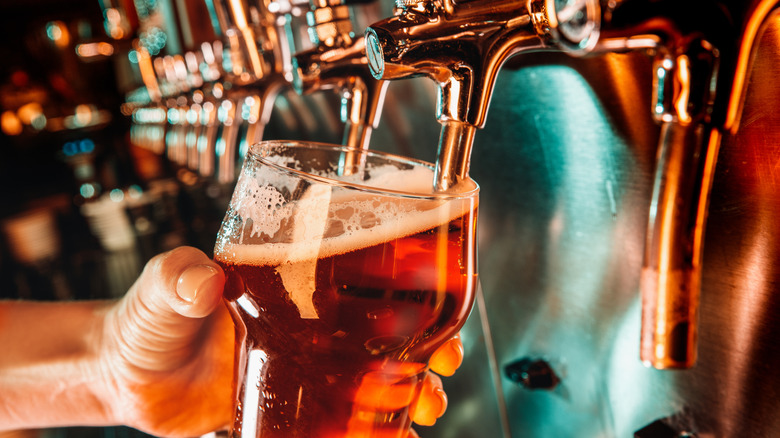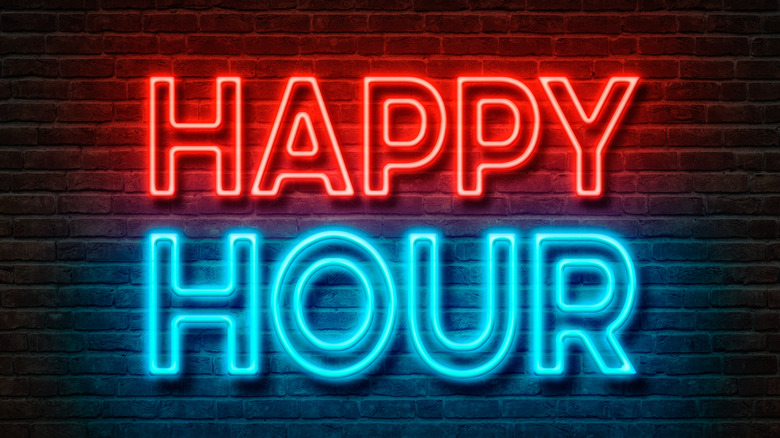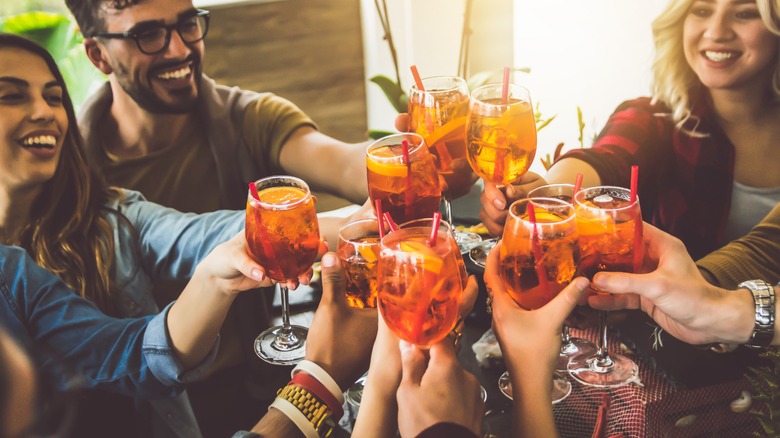How Nightlife For Massachusetts Bars May Be Changing Forever
If unwinding at the end of a long day with a glass of wine, a frosty beer, or an elegant cocktail is an occasional pastime for you, then you probably appreciate when your local watering hole offers a happy hour. The storied tradition of bars and restaurants offering discounts and specials on alcoholic drinks can be traced to Prohibition in the United States, when folks began gathering either at home or in speakeasies to enjoy a cocktail hour before heading out to eat dinner at a restaurant, where, of course, they would not be able to order any drinks. By the time Prohibition ended in 1933, the term and concept of "happy hour" stuck, with bars and eateries running promotions in order to lure customers.
Today, happy hour is an incredibly common phenomenon, but not for residents of eight states including Indiana, North Carolina, Vermont, and Massachusetts. In those states, according to MEL, happy hour drink promotions as well as "bottomless brunch" and similar events, in which discounted alcohol is free-flowing are banned due to concerns about drunk driving. In Massachusetts, according to Eater, the law banning happy hour has been on the books since 1984, but proposed legislation that was just passed by the state's Senate would give Massachusetts cities and towns the right to decide whether happy hour could be reintroduced in local establishments.
Happy hour was outlawed in Massachusetts after a news-making drunk driving accident
The last happy hour enjoyed in Massachusetts took place in November 1984, before the state banned all drink promotions in which alcohol is deeply discounted or given away free (via Eater). The decision came a year after a 20-year-old woman, Kathleen Barry, died after being dragged under the car of a friend as they were leaving a trivia game which awarded free beers as a prize; The friend drank at least seven (via The Washington Post). Massachusetts has attempted to bring back happy hour a few times, including as recently as this year, but such attempts have floundered.
That might change soon, depending on proposed legislation approved by the state's Senate last week, according to The Boston Globe. The proposed law, which pends approval by the state's House and Governor Charlie Baker, would allow municipalities to decide whether to allow drink specials during certain times of day (via Eater). Specials would have to be announced at least three days in advance and end before 10 p.m.
Introduced by Democratic state Senator Julian Cyr, the proposed legislation is part of a $4.57 billion economic development bill no doubt intended to help assuage the pandemic's devastation of local economies. But as Eater explains, even though drinks promotions could help bars and restaurants attract more customers, such establishments still suffer from staffing shortages and supply chain issues, so more customers might actually strain their operations rather than ease them.
Will the legislation pass?
According to a 2021 poll conducted by MassINC Polling Group, 70% of the Massachusetts residents surveyed were strongly in favor of bringing back happy hour, a preference which was general across political affiliations, gender, and age (via NBC Boston). But Republican state Senator Charlie Baker, who would ultimately be the one to sign the proposed happy hour amendment into law, has historically expressed support for the state's current ban on such drink promotions.
"I remember what was going on the roads in Massachusetts when we had happy hours," Baker told reporters in summer 2021 (via CBS Boston). "There were some horrible ... experiences on a very regular basis that came with happy hours back in the day. I know that probably makes me a stick in the mud to say such a thing, but I would start as a skeptic of going back to the way we ran happy hours."
But as supporters of the proposed legislator have pointed out, ride-sharing services didn't exist back in the 1980s when happy hours were banned, and such apps have made safely getting home from bars and other late night outings safer and more reliable, a development that might help the amendment gain more traction. "Particularly with the emergence of ride-sharing services like Uber and Lyft, this really helps get people to get home safely," Senator Julian Cyr, who introduced the proposed legislation, told CBS Boston.


